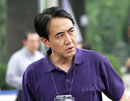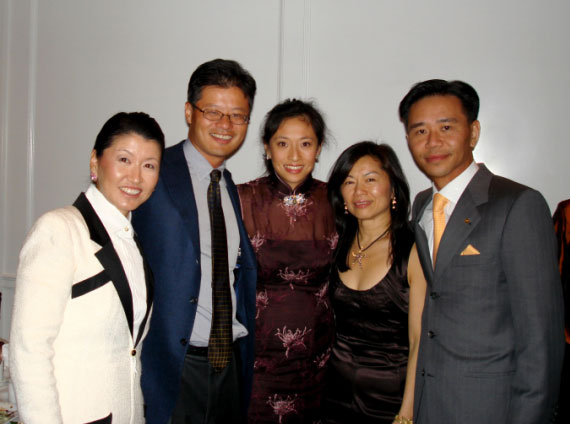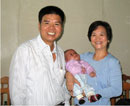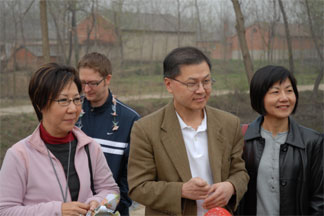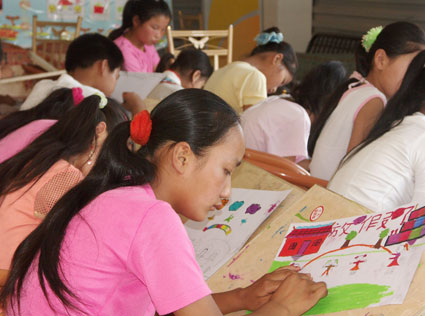Completed Programs
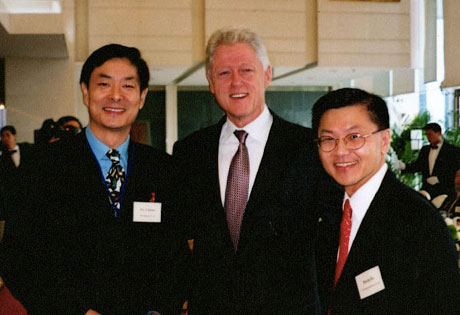 President Bill Clinton with China’s AIDS ambassador Pu Cunxin and David Ho.
President Bill Clinton with China’s AIDS ambassador Pu Cunxin and David Ho.
Since its creation in 2003, CAI’s partner organizations have completed successful programs in four primary areas: Advocacy, Professional Training, Antiretroviral Treatment, and Orphans and Vulnerable Children.
Advocacy
AIDS Summit




Top to bottom: President Clinton embraces HIV sufferer Song Pengfei; Premier Wen Jiabao visiting AIDS patients at Ditan Hospital, Beijing; Public service announcements featuring Magic Johnson and Yao Ming; Yao Ming and Pu Cunxin in CAI’s second poster campaign.
Public Service Announcements and National Poster Campaign
In 2004, CAI and the National Basketball Association enlisted China’s most famous athlete, Yao Ming, and HIV+ superstar Magic Johnson, to contribute their time to film a series of public service announcements (PSAs). The PSAs have been widely promoted, playing on national and local channels, trains and buses, and in high and middle schools.CAI developed a national poster campaign featuring Yao Ming and Magic Johnson to convey prevention and anti-stigma messages. The campaign targeted rural populations that are difficult to access via television and the web. Posters showing the NBA superstars eating together, playing ball and celebrating were disseminated nationwide.
Media Training on HIV/AIDS
CAI supported a series of media training workshops organized by Tsinghua University, to give journalists and editors knowledge and skills to inform the public about HIV/AIDS. Workshops took place all over China, and in 2006 a group of Chinese health reporters traveled to Toronto to cover the XVI International AIDS Conference.
National AIDS Hotline
In 2004 CAI helped China’s Ministry of Health prepare a strategic plan for a unified national infectious disease and emergency response hotline, with HIV/AIDS as its focus. A team supported by CAI visited the US to learn about the most advanced technology and software for call centers, training approaches for front line responders, and management systems.
Public Policy Training
CAI partner Tsinghua University organized with Harvard University a series of public policy workshops for officials charged with managing China’s front-line response to HIV/AIDS. This in-service training provides decision-makers intensive exposure to national and international best practices in prevention, treatment and care, galvanizing local officials to translate the central government’s directives into informed, responsive practices.
Regional Campaigns
CAI committees in Hong Kong, California and New York have organized several successful events to raise funds for future programs, and as importantly raise awareness among community leaders. Yao Ming’s appearance at CAI’s 2005 Hong Kong gala was especially noteworthy because it captured the attention of millions of vulnerable youth and engaged business and government leaders in the fight against AIDS.CAI volunteers mobilize to reverse the epidemic in California, New York and Hong Kong. Yao Ming at CAI’s 2005 Hong Kong gala.
Professional Training
AIDS Research Centers
In 2003 CAI and ADARC helped the Chinese Academy of Medical Sciences (CAMS) establish the AIDS Research Center (ARC), whose mission is to create a coordinating center within CAMS to direct China’s research and treatment efforts in HIV/AIDS. CAMS and ADARC have collaborated on numerous professional training projects. With help from ADARC, the ARC has pursued three main areas of training to build the health system’s capacity to respond to the AIDS epidemic, especially in rural areas. CAI has also helped establish AIDS research centers at Tsinghua University in Beijing and at Hong Kong University.
Nationwide Physicians Training
The ARC has been a pioneer in training physicians at rural hospitals to care for and treat patients living with HIV and AIDS. When the government announced its free treatment program in 2003, only a handful of doctors in China had experience with antiretroviral therapy. More limiting than access to drugs was the lack of qualified medical and technical personnel to deliver care and treatment, especially in rural areas where the need is greatest. CAI developed a physician’s network that reaches across China and applied an innovative training curriculum that focuses less on theory and more on practical, clinical experience. A number of provincial and municipal hospitals initiated their treatment programs as a direct result.
HIV/Hepatitis C Co-Infection Training
The high prevalence of HIV and hepatitis C virus co-infection poses enormous challenges to medical practitioners in China. The two diseases share modes of transmission from injection drug use, contaminated blood products, and sexual contact. With technical assistance from ADARC, CAMS’ AIDS Research Center has developed a specialized curriculum to give health care professionals the tools to respond: up to date medical information, and training in blood collection and laboratory techniques.
Bioethics
With training from ADARC, the ARC set up an Institutional Review Board (IRB) including doctors, sociologists, public health practitioners, and bioethicists to protect human subjects in its programs. The IRB has been registered and approved by the U.S. Office for Human Research Protections (OHRP) in the Department of Health & Human Services. The ARC is also promoting Community Advisory Boards to encourage communication among HIV+ members of the community and healthcare workers, local leaders/policymakers, law enforcement, religious leaders, the media and NGOs, and to enhance community understanding of the ethical dimensions of treatment and care for people living with HIV/AIDS.Antiretroviral Treatment
pMTCT-Plus Program
In 2005 CAI launched a diagnosis and treatment initiative to prevent Mother-To-Child Transmission (pMTCT) while simultaneously providing antiretroviral therapy for the mother (the “+” in MTCT-Plus.) CAI mobilized experts from overseas and within China to introduce this model of care and treatment. In 2005 the program was piloted in Hubei province, with a team of trainers from Columbia, Yale, and ADARC in collaboration with Wuhan University and Hubei health authorities. CAI is expanding this model to Yunnan, with the goal of rapidly implementing the protocol that provides both treatment for the mother and prophylaxis for the baby, systematic application of which can decrease MTCT from 33% to below 2%.
Antiviral Regimen Trials
ADARC worked closely with the Chinese Academy of Medical Sciences (CAMS) to conduct studies that have established its AIDS Research Center as one of the leading clinical research institutes in China working on HIV/AIDS. To date the ARC has conducted seven clinical trials of antiretroviral regimens, with ADARC providing technical input. Recent research is focused on defining the drug resistant profiles in Chinese patients.
Molecular Epidemiology Studies
ADARC and CAMS also collaborated on several molecular epidemiology studies, in cooperation with the Yunnan Center for Disease Control, Wuhan University, and Henan Bureau of Health. It is clear from these studies that multiple subtypes of HIV and genotypes of Hepatitis C virus have already been introduced into China, primarily from bordering countries. Multiple recombinant forms between various subtypes have also been identified. Increasing prevalence of multiple subtypes will raise the possibility of inter-subtype recombination, posing further difficulties for future treatment and vaccine studies.These programs build on ADARC’s work to establish China’s first antiretroviral treatment program in partnership with the Yunnan Centers for Disease Control and Prevention, initiated in 2003 for 80 patients in Kunming with Dr. Zhou Zengquan and Dr. Lu Lin.
Orphans and Vulnerable Children
Compassionate Care
Although CAI focuses on preventing transmission of the virus from mother to child, we cannot forget those children who are already affected or infected by HIV.From 2006–2009 we supported Fuyang AIDS Orphans Salvation Association (FAOSA), a unique community-based organization that serves over 500 orphans and vulnerable children in Anhui and Henan. The organization provides financial, educational, and psychosocial support to the children and their caregivers. For HIV+ children, FAOSA helps manage their medical care, ensuring routine check ups and laboratory tests and educating caregivers about the importance of helping children adhere to their complex drug regimens.
In 2007 ADARC supported Brandeis University to develop a community-based program that trains lay counselors to address the depression that overwhelms many children impacted by HIV. Initial results of the program are promising, with a measurable decrease in anxiety among participants.
ADARC helped build a community center to house programs serving orphans and vulnerable children in Longchuan County, Yunnan, and also supported monthly group activities there. In addition, ADARC provided donated drugs for a young girl who was the first documented case of mother-to-child transmission in Yunnan.已完成的项目
 克林顿总统与中国艾滋病宣传大使濮存昕和何大一博士。
克林顿总统与中国艾滋病宣传大使濮存昕和何大一博士。
自2003年中国艾滋病防治行动创建以来,其伙伴组织在四个主要领域:倡导,专业培训,抗逆转录病毒治疗和关注孤儿和弱势儿童,已成功地完成了以下计划 。
倡导
艾滋病高峰会议
2003年11月,由艾伦戴蒙德艾滋病研究中心和清华大学经过一年的筹备, 在北京成功地举行了中国艾滋病高峰会议,是中国艾滋病防治行动的第一次倡导活动。美国前总统克林顿在高峰会议上通过电视,互联网,报纸和无线电直接向中国观众传递了艾滋病的存在和预防上的信息。克林顿总统在讲台上拥抱一位艾滋病患者,这一举动在中国引起了极大的反响,并促使中国高阶层领导人从2003年12月开始,对艾滋病的蔓延做出了强有力的回应。
公益广告和国内海报活动
2004年,中国艾滋病防治行动和美国国家篮球协会,邀请了中国著名篮球明星,姚明和艾滋病病毒携带者魔术师约翰逊,贡献他们的时间拍摄了一系列预防艾滋病的公益广告。该广告通过电视台,火车和公共汽车,以及地方渠道广泛推广,传递到了高中和初中学校。中国艾滋病防治行动开展了以姚明和魔术师约翰逊做宣传的国内海报活动 ,教育广大民众如何预防艾滋病,不要歧视艾滋病患者。广告活动主要针对乡村地区的不能收看电视、上不了互联网的民众。,主题是这俩位篮球明星在一起吃饭,打篮球和交谈,广告已发行到全国。
艾滋病媒体培训
中国艾滋病防治行动资助清华大学举办的一系列媒体培训,目的是加深新闻记者和编辑对艾滋病的理解和如何利用媒体报道艾滋病,并在全国各地举行了研讨会。 于2006年,资助众多报导中国健康新闻的记者,参加了在多伦多举办的第十六届国际艾滋病会议,使他们领略了不可多得的实践经验。
全国艾滋病热线
2004年,中国卫生部决定建立一条以艾滋病为主的传染病热线。中国艾滋病防治行动帮助卫生部的健康教育学院制定了一个详细的规划,并且邀请他们到美国社会健康协会实地考察学习,中国代表团学到了最新的技术和处理热线的软件,以及热线管理系统。
公共政策培训
中国艾滋病防治行动合作伙伴清华大学和哈佛大学举办的一系列的培训班,培训对象是在中国应对艾滋病毒/艾滋病前线的主管政府官员,和省级党校以及省级卫生机构的领导干部,培训班的目的是为他们提供国内外最有效的艾滋病预防和治疗和护理方案,帮助他们做出适当的决策。使中央级以下的省,市级领导干部能够领会政府的政策,使政府的决策有效地在艾滋病重灾区实施。
地区募捐活动
中国艾滋病防治行动委员会,在香港,加利福尼亚州和纽约为未来的预防艾滋病项目,已成功地组织了几次筹款活动,它在中国南方和香港引起了很大的反响。 2005年,中国篮球明星姚明参加了香港筹款盛会,他的出现使千百万易受感染艾滋病的青少年意识到艾滋病病毒的存在,调动了企业家和政府领导积极参与艾滋病抗争活动。为遏制流行,在加利福尼亚,纽约和香港,参加中国艾滋病防治行动的赞助人员 姚明于2005年在香港参加中国艾滋病防治行动的筹款盛会
职业培训
艾滋病研究中心
2003年中国艾滋病防治行动和艾伦戴蒙德艾滋病研究中心,帮助中国医学科学院建立了艾滋病研究所,研究所将在中国医学科学院内建立一个协调中心指导在中国的艾滋病研究和治疗工作。中心的一个主要目标是向中国的医学院,医院和生物医学研究室传播先进科学技术。中国医学科学院和艾伦戴蒙德艾滋病研究中心,联合举办了多种职业培训班。在艾伦戴蒙德艾滋病研究中心的帮助下,艾滋病研究所主要在下述三个领域提供培训,建立一个卫生系统以达到能够对艾滋病流行,尤其在农村的流行作出相应的应急反应。中国艾滋病防治行动还帮助北京清华大学和香港大学建立了艾滋病研究中心。
广范的医生培训
中国医学科学院艾滋病研究所,是提供培训乡村医生在医院如何照顾和治疗艾滋病毒和艾滋病患者的先驱。在2003年中国政府宣布免费治疗计划时,只有极少数的医生具有治疗艾滋病的临床经验。有经验的医生和护理人员比艾滋病药物更缺乏,尤其是农村地区专业人员的奇缺更为显著。中国艾滋病防治行动制定了一个覆盖全国各地的医生网络和应用创新的培训课程,注重实际与临床经验的培训多于理论,直接在一些省级和市级医院开展的治疗计划中产生结果。
艾滋病毒/丙型肝炎感染护理专业人员培训
艾滋病毒和丙肝病毒感染非常普遍,这是中国医务人员面临的巨大挑战。两种疾病具有共同的传播途径:静脉注射毒品,输血制品,和性行为。在艾伦戴蒙德艾滋病研究中心的技术帮助下,中国医学科学院的艾滋病研究所开设了专门课程,为医护专业人员提供最新的医疗信息和应对措施,以及培训医生和护士正确收集血液标本和实验室技术。
生物伦理学培训
在艾伦戴蒙德艾滋病研究中心的培训下,中国医学科学院艾滋病研究所建立了研究所审查委员会,专门保护参加国内和国际的艾滋病研究人员。并已在美国人类服务卫生署的人类研究保护办事处注册并受其保护。研究所审查委员会的人员包括:医生,社会工作者,公共卫生工作人员和生物伦理学家。艾滋病研究所也促进社区咨询委员会, 鼓励艾滋病患者与医护人员,地方领导/政策制定者,法制人员,宗教人士,媒体和非政府组织的交流,加深社会公众对艾滋病毒/艾滋病治疗护理所涉及的内容,质量及道德方面的理解。抗病毒药物治疗和护理
母婴传播计划
2005年中国艾滋病防治行动,在为艾滋病病毒患者提供抗逆转录病毒治疗的同时为防止艾滋病毒病母婴传播,启动了一个新的诊断和治疗行动,中国艾滋病防治行动动员海外专家,把防止母婴传播护理治疗方案引入中国。2005年春,该计划的先期实验首先在湖北省开始,参与该计划的有:哥伦比亚大学,耶鲁大学,艾伦戴蒙德艾滋病研究中心,武汉大学和湖北省卫生厅,中国艾滋病防治行动已将该计划扩展到云南省,,其目标是对艾滋病阳性孕妇和婴儿提供快速治疗和防御,正确运行此方案可以将母婴传播由30%降低到2%以下。
抗病毒治疗方案试验
艾伦戴蒙德艾滋病研究中心,与中国医学科学院艾滋病所密切合作进行临床抗病毒研究,到目前为止7个抗艾滋病治疗临床方案已经实施,艾伦戴蒙德艾滋病研究中心提供技术帮助。目前重点项目是对中国患者抗逆转病毒的抗药性研究。
分子流行病学研究
艾伦戴蒙德艾滋病研究中心与中国医学科学院合作,进行多个分子生物学流行性研究 ,合作伙伴包括:云南省疾病预防控制中心,武汉大学,河南省卫生厅。研究结果显示多种不同艾滋病病毒亚型和不同丙肝病毒基因型从周边国家传入中国。艾滋病毒基因型变得更加复杂。由不同亚型病毒重组产生的多种重组病毒陆续被发现。不同亚型病毒的重组可能性还会增加,将使治疗和疫苗研究工作更加困难。艾伦戴蒙德艾滋病研究中心在这些程序的基础上,与云南省疾病控制预防中心,建立中国第一个抗逆转录病毒治疗的计划, 2003年在昆明由周曾全医生和陆林医生开始治疗80例。
孤儿和弱势儿童
关爱
虽然中国艾滋病防治行动的重点是防止母婴传播病毒,同时我们不能忘记那些已经受到影响或已感染艾滋病毒的儿童。自2006-2009年,我们支持了阜阳艾滋病孤儿救助协会,一个独特的为救助安徽、河南500多名孤儿和弱势儿童,以社区为基础的服务机构。该组织提供财政、教育、心理安抚给儿童和他们的照顾人。对HIV阳性儿童,阜艾孤儿救助会帮助管理他们的就医治疗,确保日常检查及化验测试,辅导照顾孤儿的人怎样遵守使用其复杂的药物治疗方案。
2007年艾伦戴蒙德艾滋病研究中心支持Brandeis大学,开发以社区为基础的培养心理辅导员计划,解决许多受到艾滋病毒影响的儿童消除心理抑郁障碍。该计划取得了初步成效,参与者明显地减少了忧虑情绪。
艾伦戴蒙德艾滋病研究中心,帮助云南省陇川县建立了一个以安置孤儿和弱势儿童的社区中心,也支持他们每月的活动。此外,艾伦戴蒙德艾滋病研究中心提供捐赠药物,给一个年轻的姑娘,她是首次被发现记载云南母婴传播的儿童。